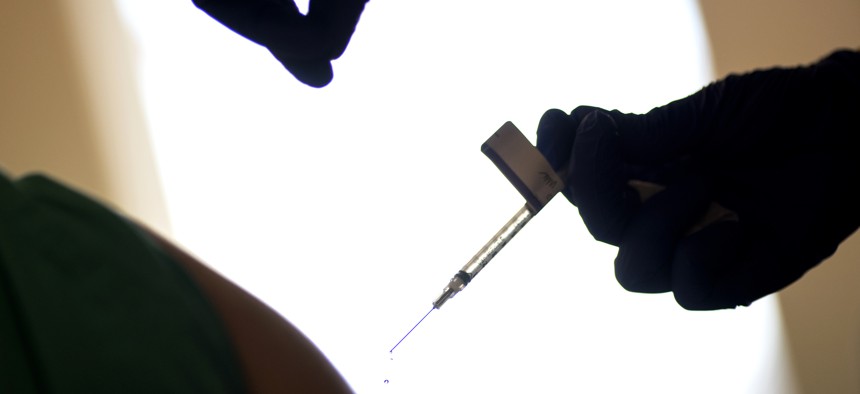Researchers Examining Covid Vaccine Barriers, Skepticism in Five Communities

In this Tuesday, Dec. 15, 2020 file photo, a droplet falls from a syringe after a health care worker was injected with the Pfizer-BioNTech COVID-19 vaccine at Women & Infants Hospital in Providence, R.I. AP Photo/David Goldman
Johns Hopkins Center for Health is overseeing the project, which researchers hope can help state and local governments address challenges in distributing the coronavirus vaccine to the general public.
Initial doses of the Covid-19 vaccine were distributed to frontline healthcare workers in a relatively straightforward manner, with many vaccinated at hospitals where they work.
But in the months to come, state and local governments will face challenges getting vaccines to the general public, including to residents of remote areas and in communities where skepticism of both government and the vaccine runs high.
To help local governments assess and navigate this complicated new task, the Johns Hopkins Center for Health has launched a new research initiative aimed at assisting public health officials while they develop distribution plans and messaging campaigns that will address community concerns.
The center’s CommuniVax initiative will work with researchers in five communities to conduct ethnographic research related to Covid-19 vaccination. Research teams will focus on historically underserved communities of color in southeastern Idaho, San Diego, Baltimore, Prince George’s County, Maryland and Tuscaloosa, Alabama. The goal is to understand the fears, hesitancies and barriers that could prevent community members from getting the vaccine.
“By understanding the concerns and desires of people of color and the constraints they experience, and by supporting them to take charge of their hometown’s vaccination responses, this project has the potential to increase vaccination rates and decrease the health, economic, and social effects of the pandemic,” said Monica Schoch-Spana, a medical anthropologist at the center.
Research is expected to be conducted through February. The data will be compiled in real time so findings can be assessed and recommendations made by early spring, said Stephanie McClure, an assistant professor of anthropology at the University of Alabama, who leads the research team there. The 11-person team in Alabama will conduct research in six counties in and around Tuscaloosa to gather data for the project.
“Our job is going to be finding out, to the extent that we can, what is the situation in this community with regard to willingness to take the vaccine, material ability to take it, access to the vaccine, and their understanding about what the vaccine does and its efficacy,” McClure said.
Many parts of Alabama are rural, and residents may not live near hospitals or healthcare centers that could administer vaccines, McClure said, describing some of the potential difficulties. In areas without public transit, residents may not have a way to get to facilities where the vaccine is available or they might work shifts that don’t leave them free during regular business hours.
The coronavirus pandemic has taken a particularly devastating toll on minorities. Black and Latino people who contract Covid-19 are 2.8 times more likely to die from the virus than white individuals, according to the Centers for Disease Control and Prevention.
But some people in communities of color may be hesitant to get vaccinated because of poor or unfair treatment by healthcare systems in the past, McClure said.
“There is a history of distrust and hesitancy that actually has very legitimate roots,” she said.
In particular, researchers have pointed to the Tuskegee Syphilis Experiment, a once-secret government study that left hundreds of Black men in Macon County, Alabama untreated for syphilis so researchers could observe how the disease progressed.
As initial rounds of coronavirus vaccines are distributed, public health officials will also have to respond to disinformation about its safety and efficacy, McClure said.
“The decision to get the injection or not is predicated on a lot of things,” she said. “We are going to be looking at the gamut.”
Andrea Noble is a staff correspondent with Route Fifty.
NEXT STORY: What Will 2021 Hold for Cities?





